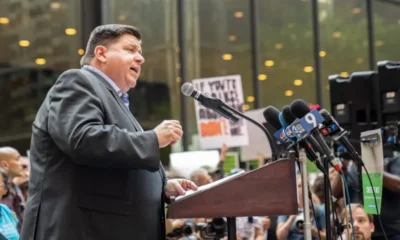Connect with us
Published
3 years agoon

As a handful of other states continue to press forward in their efforts to legalize medical and recreational cannabis use, Idaho is putting their hat in the ring. Notably, cannabis activists in the state have submitted revised text for a ballot initiative that would legalize cannabis in Idaho, following a review by the state attorney general.
This is not the only cannabis legalization effort currently underway in the state, as there is a separate campaign currently working to legalize medical cannabis in Idaho, with advocates actively collecting signatures to qualify the measure for the 2022 ballot.
The adult-use initiative as it stands is fairly limited in scope: It would make cannabis possession of up to three ounces lawful on private property for adults 21 and older; home cultivation would be prohibited; and there would be no legal and licensed system of cannabis retailers.
With those regulations in place, possession outside of a private Idaho residence would generally remain criminalized in the state, but the measure says that “transporting a personal amount of marijuana from a jurisdiction where the marijuana was legally purchased” would be legal. This means that adults could travel to dispensaries in neighboring states like Montana, Nevada, Oregon and Washington and bring cannabis home with them.
Following the initial filing of the measure, the state attorney general’s office sent a letter to the secretary of state outlining concerns around legal issues and making non-binding recommendations for changes to the bill. Idaho Citizens Coalition activists have now accepted some of the recommendations, but not all, in an updated version of the Personal Adult Marijuana Decriminalization Act (PAMDA) they filed Friday, July 9.
Idaho’s attorney general did, however, express concern around social sharing, saying it would allow multiple cannabis transactions, so long as they stayed under the three-ounce limit.
“My reaction was, ‘yes—yes, it would,’” Belville told Marijuana Moment. “And the way I’m defending that…is that’s what people do now. They go in on an ounce, someone drives to Ontario to buy it, they bring it back, they keep their share and they give their other shares away to whoever went in on it. We want to make sure that’s legal.”
For both the recreational and medical cannabis legalization initiatives, cannabis advocates have until May 1, 2022 to collect about 65,000 valid signatures from registered voters in order for the proposals to show up on the ballot later that year.
The medical cannabis proposal would allow qualifying patients to purchase and possess up to four ounces of cannabis, and those with a “hardship designation” would be allowed to cultivate up to six plants.
The medical initiative lists 12 conditions which would make a patient eligible for a medical cannabis prescription, and it extends to any terminal disease or severe chronic illness. This is not set in stone, as Idaho’s health department would be allowed to add additional conditions as needed.
One roadblock is unique to the state, in that the governor signed a bill earlier this year that requires a minimum of 6 percent of voters in all 35 of Idaho’s legislative districts to sign a ballot proposal in order for it to qualify. Previously, the law required reaching that same threshold, only in 18 districts.
There are currently two lawsuits challenging that policy in Idaho’s Supreme Court, and the result could easily decide the fate of the cannabis measures.
Idaho has a storied history in cannabis advocacy and pushing for legalization. Activists pushed the state for a nearly identical measure for medical cannabis to hit the 2020 ballots, but they ended up abandoning the effort following issues with signature gathering around the COVID-19 pandemic, and Idaho’s refusal to provide accommodations.
Idaho is one of a handful of states currently in various stages of petitioning for cannabis legalization measures, joining the likes of Arkansas, Mississippi, Missouri, Nebraska and North Dakota. They sit beside 18 states where recreational cannabis is legal.


German Authorities to Ban Cannabis Smoking, Vaping at Festivals Including Oktoberfest


Illinois Governor Cites Cannabis Reform While Campaigning for Biden


States With Legal Weed See Increase in College Applications


‘Star Wars’ Blue Milk Released from Multiple Brands Ahead of May the 4th


Stoners Still Gathered at Hippie Hill for 4/20 Celebration Despite Event Cancellation


Ohio Company Signs Deal To Grow Hemp for Bioplastic
